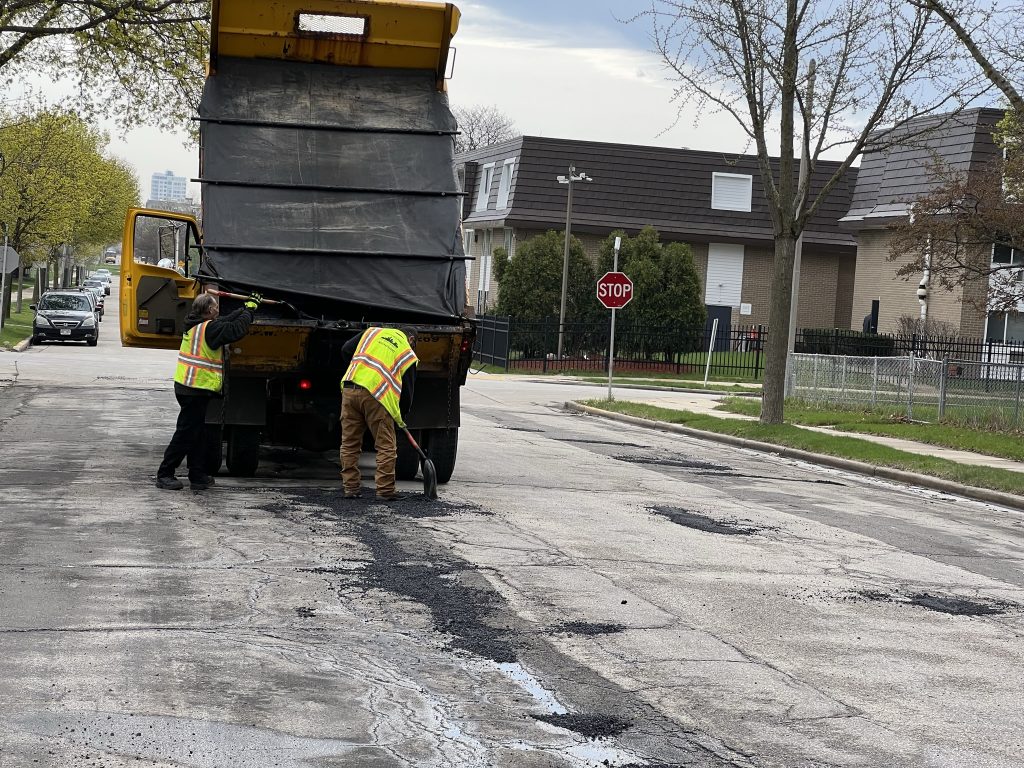How Can Milwaukee Solve Its $820 Million Road Funding Backlog?
More than a quarter of city's streets are in 'poor' condition. The solution?

A Department of Public Works crew fills potholes by W. Juneau Ave. and N. 20th St. Photo by Jeramey Jannene.
Milwaukee is investing a record amount of money in repaving its streets, but the condition of its local roads is deteriorating to alarming levels.
It’s a paradox city officials admit they have no plan to escape.
More than a quarter of the city’s 5,100 lane miles are currently in “poor” condition according to a 2022 automated pavement survey and Department of Public Works (DPW) repair data.
The majority of those “poor” roads are local roads, side streets that connect residences to a network of collector and arterial roadways.
“Far too many neighborhood roads are cracked, crumbling and overdue for repair,” said Alderman Peter Burgelis during a meeting of the Finance & Personnel Committee Wednesday.
The discussion, which stemmed from a contested budget amendment Burgelis successfully introduced to add $4 million in borrowing for local road construction, called for DPW to identify solutions for what the department estimates is an $820 million backlog of streets in “poor” condition that need repair. Of that backlog, $752 million is for local roads.
Burgelis chided Mayor Cavalier Johnson‘s administration for only proposing $12 million in the 2025 budget to address the $752 million backlog. “We are going backwards,” he said.
“The challenge is… two fold,” said City Engineer Kevin Muhs. “One is a lot of money that is dedicated to those major roads, it cannot be shifted to local streets based on those federal and state grants. And the other piece is… we had, 20 to 30 years ago, a period where the city wasn’t investing in its street network. As those roads where we hoped investment happened 25, 30 years ago didn’t happen, we now have an additional bulge of roads that all need investment at the same time.”
Muhs, who previously led the Southeastern Wisconsin Regional Planning Commission before joining the city in 2022, said DPW has been spending at or above the $60 million annual threshold it estimates is necessary to maintain the system. But because much of that money comes from state and federal grants targeted at busier streets, local roads have been left to deteriorate.
While state gas taxes pay for streets, that funding only covers major roads and highways. Municipalities are left to pick up the tab for their less-used streets. Oklahoma Avenue gets the cash from the pump and other state fees, but Otjen Street gets next to nothing, leaving Milwaukee on its own for a local street like it.
For years, the city tried to levy a special assessment on neighboring property owners to repair local roads. But it led to substantial resident opposition and canceled projects. In 2008, the city ditched the assessment system for a $20 vehicle registration fee (VRFs), commonly called a “wheel tax.” In 2021, the fee was increased to $30. Other communities across the state, including Milwaukee County, have added their own VRFs.
Raising The Wheel Tax?
Increasing the fee further is one of four options Muhs listed in a memo that could be used to address the local road crisis.
“Basically, each ten dollar increment gets us a little over $3 million [annually],” he said.
“If we increase the wheel tax by $10 for the city of Milwaukee, it would take 241 years to raise $752 million,” said Burgelis in one of several statements designed to illustrate just how absurdly deep the hole is.
The alderman cited a Wisconsin Policy Forum report that shows that Milwaukee and Wisconsin’s fee mix makes it one of the lower cost major cities in the Midwest to register a vehicle.
What about making it $100? State law doesn’t impose a limit.
“That would be the last vote we would take because we wouldn’t be around anymore,” said Ald. Scott Spiker.
There are also two key issues with a vehicle registration fee: it doesn’t impact vehicles that aren’t housed in the city and it can’t be adjusted by vehicle weight, despite the fact that heavier vehicles cause a disproportionate amount of wear.
“Very few of those large trucks that you’re talking about are subject to the city’s registration fee,” said Muhs of council members questions about going after the trucks doing the damage.
The City Engineer also believes something other than 18-wheelers is harming the side streets. “When it comes to the local streets, generally speaking, what we are talking about is weather impacts to the pavement,” he said.
“The state can’t ban that unfortunately, the freeze-thaw cycle,” said Spiker.
Other Revenue Options
Muhs offered three other policy options for the council to consider to fund local roads: lobby for a larger state local road program, expand its bonding or pursue a utility.
Milwaukee currently receives $1 million every other year from Wisconsin’s Local Road Investment Program, said Muhs. It must match each award dollar for dollar. “The [program] is quite small,” he said. Muhs added that it’s structured to favor smaller communities.
The city could also issue more debt to fund local road reconstruction. But the city already spends more than $100 million on debt service, approximately a third of its property tax levy. The debt service costs were the mayor’s reason for vetoing Burgelis’s road funding increase. The council overrode the veto and Burgelis called the veto itself “stunning” Wednesday.
The third option, a transportation utility, has promise, if it can survive a court challenge.
“The basic concept behind this is to account for the fact that the vehicle registration fee is only applied to vehicles that are housed in the city and therefore is overwhelmingly applied to residents of the city, and that is not necessarily, particularly in the example of the city of Milwaukee, not the overwhelming user of the street network,” said Muhs. “We are a destination, we have a lot of business based here, there are other ways to think about how you could allocate a fee to more equitably recognize the use of a road.”
He suggested a potential fee based on the number of parking spaces. “My personal favorite is charging per parking spot. There is a lot of research that shows providing parking encourages people to drive, it’s a more determinant factor than congestion in determining if people use alternative modes,” said the engineer.
The Village of Pewaukee and Town of Buchanan have both lost court cases regarding their transportation utility fees.
And even if the city can get more cash for local roads, it will face other issues.
The high-impact paving program, which includes replacing the top layer of asphalt and extends the life of a roadway by 10 to 15 years, is only suitable for approximately 40% of local roads because it isn’t suitable for roads with older stone curbs or tarmacadam (a mix of tar and aggregates) pavement.
Muhs said a surge of funding would also bring with it capacity challenges for in-house engineering and outside contracting. And it would stress funding for related sewer and street lighting work that accompanies reconstruction projects.
“We are really in a conundrum here,” said Spiker.
So What’s Next?
“What’s the plan?” asked Burgelis, perhaps rhetorically.
Budget director Nik Kovac said the city has pursued as much federal funding as it can get, because the local match required isn’t as significant. As a result, it can pair one local dollar with four or five state and federal dollars. But that has left local roads challenged. And federal funding is in a state of upheaval under the Trump administration.
“I don’t think the administration has a plan for what to do with the local roads and they’ve kind of laid out why we don’t have one either,” said Spiker, trying to summarize the situation. “You either borrow to the hilt or you raise the wheel tax.”
“The plan we have is not good enough,” admitted Kovac.
The issue is likely to come to a head — again — during the fall budget debate.
If you think stories like this are important, become a member of Urban Milwaukee and help support real, independent journalism. Plus you get some cool added benefits.
Political Contributions Tracker
Displaying political contributions between people mentioned in this story. Learn more.
- May 7, 2015 - Nik Kovac received $10 from Cavalier Johnson
City Hall
-
Council Blocked In Fight To Oversee Top City Officials
 Dec 16th, 2025 by Jeramey Jannene
Dec 16th, 2025 by Jeramey Jannene
-
Latest Effort to Adopt New Milwaukee Flag Going Nowhere
 Dec 3rd, 2025 by Jeramey Jannene
Dec 3rd, 2025 by Jeramey Jannene
-
After Deadly May Fire, Milwaukee Adds New Safety Requirements
 Dec 2nd, 2025 by Jeramey Jannene
Dec 2nd, 2025 by Jeramey Jannene
Transportation
-
Congestion Pricing Cuts Air Pollution in New York City
 Dec 14th, 2025 by Jeff Wood
Dec 14th, 2025 by Jeff Wood
-
FTA Tells Milwaukee to Crack Down on Fare Evasion — Even Where Fares Don’t Exist
 Dec 12th, 2025 by Graham Kilmer
Dec 12th, 2025 by Graham Kilmer
-
Will GOGO’s Bus Service Ever Get Going?
 Dec 9th, 2025 by Jeramey Jannene
Dec 9th, 2025 by Jeramey Jannene






















I am tired of paying for those who live outside of the city, but utilize our roads, venues, and attractions. We pay for AmFam even though the majority of those fans are from outside the city and now you talking about raising the wheel tax again? I am glad Mr. Muh’s acknowledged that the “overwhelming use” of the roads in Milwaukee are from people outside of Milwaukee. We need a solution that will address that!!!
Some years ago, while commenting on a piece about expanding the freeway, I suggested a solution that would allow more vehicles per lineal foot of roadway. A vehicle registration fee that would be based on a wheelbase/weight formula would attract vehicle owners to smaller, lighter vehicles which would allow more vehicles per foot on the roadway. With that result, more roadway would not be necessary.
Perhaps now is the time.
The Milwaukee County Retirement debacle strikes again. It’s the “gift” that just keeps on giving and will for the next 200 years.
FWIW so I know it isn’t mentioned, maybe it isn’t allowed, but the state fuel tax seems to be a good source to raise some funds. The fuel tax is now 31 cents a gallon and hasn’t been raised since 2006. Adjusted for inflation (since 2006) the tax should be 49 cents a gallon. The state fuel tax revenue was $1.05B on 3.420B gallons of gas in 2024 and would gain almost $400m annually if the fuel tax was raised. Politically earmark these funds for local road improvements throughout the state and nothing else.
how can we improve or roads?
our roads
@jrockow – Milwaukee County’s pension woes don’t impact the city’s roads, though the city has its own pension challenges.
@Duane – if the current legislature raised the fuel tax (doubtful but possible), I’m guessing they would earmark the majority of local road funding for anyplace other than Milwaukee or Madison. Just like they did with the local government aid in the last budget cycle.
If people think this is an issue, everyone should be in support of the city rightsizing roadways like walnut and lisbon and reducing lanes. All this helps us have less maintenance costs in the future.
I don’t drive, but this is quite noticeable while biking throughout the city. Credit to Milwaukee for adding in partially protected bike lanes on 60th – hopefully this will reduce repair costs in the future. Suburbanites aggravate me in many ways, just one of which being using our roads and paying nothing for it. Any way we can shove the cost onto them would be great imo.